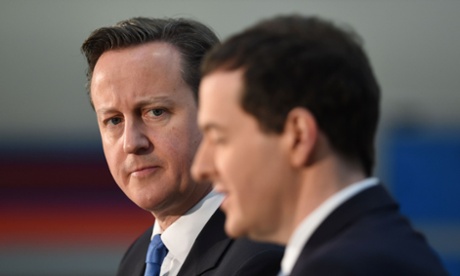
Afternoon summary
- In a speech in Hove, East Sussex, David Cameron has set out his party’s plans for welfare. He has announced that, under a Tory government, 18- to 21-year-olds who fail to find a job or a place in training after six months would be forced to undertake community work in return for a new type of benefit called Youth Allowance. The department for work and pensions piloted a similar scheme in London after the riots and ruled that it had little effect on getting people into work.
- Shadow chancellor Ed Balls has written to the chancellor George Osborne, asking him to explain his knowledge of the conduct of HSBC’s Swiss subsidiary. Guardian political editor Patrick Wintour writes: “Labour is frustrated that the chancellor has avoided questions on the issue for a week week, while both Ed Miliband and Ed Balls have been repeatedly pressed on relatively trivial issues such as whether they kept tax receipts for a window cleaner”.
- Church of England bishops have released a “pastoral letter”, the first of its kind delivered before an election, in which they attack a “growing appetite to exploit grievances” and “find scapegoats” in British political life. You can read the letter here and the Guardian story is here. The House of Bishops warned that people feel detached from politics and called for a “fresh moral vision of the kind of country we want to be”.
- Figures from the Office for National Statistics show that inflation dropped to 0.4% in January. This is down from the 0.5% recorded in December and well below the Bank of England’s 2% target. Here’s the Guardian’s report on the figures from our economics correspondent Phillip Inman. The government has, unsurprisingly, welcomed the news, with Cameron tweeting that it meant “security for hardworking taxpayers”.
- Channel 4’s spoof Ukip documentary – which depicted riots on Britain’s streets in the wake of the party’s general election win – has prompted nearly 1,000 complaints from viewers. The programme, which aired last night, has been criticised as revealing the political bias of the broadcaster. Here is the trailer for Ukip: The First 100 Days.
The Times is reporting that Conservative MP for Bristol North West, Charlotte Leslie, has backtracked on a pledge to return £5,000 donated by a businessman whose company was ordered to pay back £13 million in unpaid tax.
In December Leslie was given a personal donation by Hugh Sloane, the multimillionaire co-founder of Sloane Robinson, an investment management company, which was ordered to pay £13 million in unpaid tax in 2012 after a tribunal.
Leslie initially indicated that she would return donations from those found guilty of tax evasion, but last night issued a statement saying that as “there was no criminal prosecution of Hugh Sloane or of his company for tax evasion” so she would not be refunding the money.
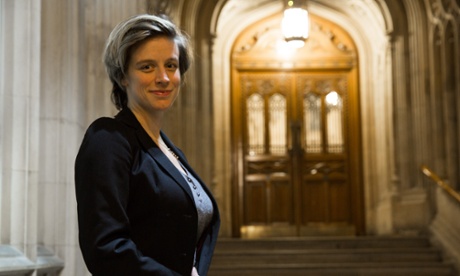
BREAKING: I can exclusively reveal that Harriet Yeo, chairman of Labour's NEC 2012-13, is quitting the party over Ed M's position on Europe
— Isabel Oakeshott (@IsabelOakeshott) February 17, 2015
In Harriet Yeo’s twitter biography, she describes herself as “Pro EU referendum”.
A commenter below (michaelsylvain) has drawn my attention to some tweets by Jonathan Portes, director of the National Institute of Economic and Social Research.
Portes is saying that the department for work and pensions piloted and evaluated the scheme that Cameron announced today in London after the riots and that they found it had little or no positive impact on getting young people into work.
Pilot for youth unemployment scheme PM announced today was evaluated by DWP in December. @AdamBienkov summarised: http://t.co/MYuWNXheIB
— Jonathan Portes (@jdportes) February 17, 2015
A reminder that DWP evaluation found compulsory "community work" for unemployed had little or no positive impact: http://t.co/ZtAIVZEFWv
— Jonathan Portes (@jdportes) February 17, 2015
Here’s a write-up of those evaluations from Adam Bienkov at Politics.co.uk from December last year. His final line is:
Hopefully the failure of this scheme should give the next government at least some pause for thought before forcing even more young jobseekers into unpaid work.
Here’s a quick roundup of some of the most interesting political comment around today.
The nasty party is back, but this time online, Rachel Sylvester in The Times
The Tories are pouring huge resources into Facebook to increase the number of people who see their campaign literature and watch the online ads — they are spending more than £100,000 a month on adverts designed to increase the number of Facebook “likes” for particular pages, and on securing email addresses used to contact potential voters. The rate of spend will only go up between now and the election.
Dear Sir Robert Francis, your report on NHS whistleblowers is not enough, Dr David Drew in The Independent
2001 Sir Ian Kennedy published his report on the Bristol Heart Scandal. In recommendation 107 he urged the development of a safe reporting system for patient harm. Your review, 14 years on, shows this has not happened. You have failed to explain why.
Who dares confront Jeremy Hunt, NHS bully-in-chief?, Polly Toynbee in the Guardian
Who should be blowing whistles loudest on all of this? Staff in the wards and the community, of course, but the loudest blasts should come from managers. They are under unbearable pressure to obey political targets, despite unprecedented per capita cuts in resources. When Hunt calls to bully them, chief executives should give an honest whistleblower’s reply: No, minister, it can’t be done .
The NHS is just holding together with a £700m pre-election bung, but the BMA knows the truth. Yesterday it launched its “No More Games” campaign to warn politicians that wheezes and quick fixes won’t do. Voters need to know about funding: the UK spends less than similar countries, and the NHS needs a lot more money.
Two pints of lager and a VAT receipt, please, Richard Littlejohn in the Daily Mail
Tipping is good manners, not tax evasion. Paying cash for small services rendered is convenient for all concerned. The world doesn’t always operate along Treasury tramlines. Mrs Thatcher understood that. Housewives understand that, so do small business owners. Outside the Bubble, everyone gets it. Balls clearly doesn’t. If he needs further clarification, perhaps he’d like to request a VAT invoice from the next bloke who offers to Tarmac his drive. Call it a monkey for cash.
Of all the political sins, hypocrisy is worst – especially for Labour, Dan Hodges in The Telegraph
Hypocrisy is toxic. But if anything it is even more toxic for Labour than the Tories.
That is because moral superiority is basically all Labour have left now. Ed Miliband’s party long ago gave up trying to convince the country Labour could govern more efficiently or prudently than the Conservatives. Their entire offer is now based upon convincing people they can do so more ethically.
Which was always going to be a tough ask. The voters are currently minded to declare a plague on the house of every politician. But if we get many more examples of Labour’s tax avoidance, it will become impossible. Because hypocrisy is the original political sin.
He famously drank champagne with Tony Blair upon the former prime minister’s arrival at number 10, but former Oasis front man Noel Gallagher is now as disillusioned with politics as the rest of the public seem to be.
Gallagher has told pop culture website The Quietus that he wasn’t into politics anymore.
These days, my own view is that if they truly, truly wanted to fucking better the lives of the people, surely they must all realise that a little bit of conservatism married with a little bit of socialism, married with a little bit of fucking UKIP and a little bit of Green and a little bit of Lib Democrats would be kind of perfect. But they’re all into power, they’re not into politics. And they’re all career politicians and populists. And you know, the next Prime Minister after this one will be Boris Johnson because of that.
He said that Ukip leader Nigel Farage didn’t “look like he could be mentally capable of running a corner shop, far less a fucking country.”
I can’t not vote, because I think that’s copping out, but my vote is to fucking vote for something ludicrous because the Labour Party are a fucking waste of time. I just don’t trust – trust is not the right word – I don’t believe in any of them. I really believed in Tony Blair, for right or wrong, and until Al Qaeda flew those planes into those towers. Everyone seems to forget that things before that were fucking alright. And now the Conservatives are just... I mean, what the fuck? David Cameron, he’s trying to be your mate. “Oh, I really like The Jam.” Thatcher was just like, “I’m fucking you in the arse, fuck what you say.” You can kind of respect that.
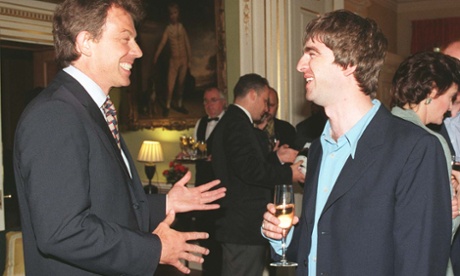
The Guardian’s Scotland correspondent Severin Carrell reports that Jim Murphy has been forced to delete a YouTube video and tweet alleging that four times as many hospital operations were being cancelled in Scotland after it emerged Labour had misread the data.
The Scottish Labour leader released a video on Monday accusing Scottish ministers of covering up a far higher rate of cancelled operations than in England, saying: “Our NHS is too important to be silenced by SNP ministers embarrassed by politically inconvenient statistics”.
But Labour has had to admit today that they mis-read the figures and Scottish health secretary and Scottish National Party member, Shona Robison, has called for an immediate apology to NHS staff.
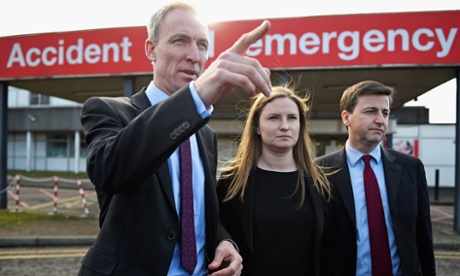
Updated
Ed Miliband has been doing one of his ‘people’s question time’ events today, this time in Lincolnshire. He has said that people must not mistake criticisms of the Israeli state and let them slide into anti-Semitism. “I mean, look, I am Jewish and I am a critic of some of the things that the government of Israel have done”, he said.
Speaking about extremism, Miliband said: “I think there is real fear among Jewish families, among Muslim families, among people from all backgrounds about the rising intolerance that people see.
“Now we have got to recognise it. But in my view recognising it is not enough. I think Europe’s leaders have got to show a unity of purpose in tackling these issues, because I don’t think we can walk by on the other side when we see the kind of events we saw in Copenhagen.”
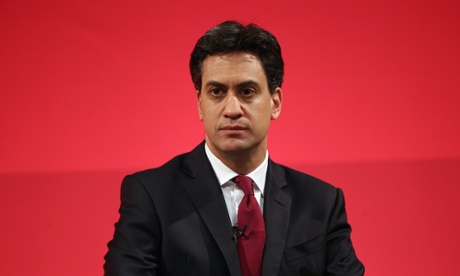
Ed Balls writes to George Osborne demanding answers on the HSBC scandal
Shadow chancellor Ed Balls has written to chancellor George Osborne to demand that he answer questions on the HSBC tax evasion story. In recent days the Labour party has accused Osborne of being a “submarine chancellor”, as he has been completely silent on the issue.
In the letter, which starts “Dear George”, Balls writes: “There are a number of questions which you have failed to answer over the last eight days and which cannot continue to be brushed under the carpet.”
Balls goes on to ask five questions –
1. Why has there only been one prosecution out of 1,100 names? Was the “selective prosecution policy” a decision made by Ministers?
2. When were you first made aware of these files, what action did you take and did you discuss it with the Prime Minister?
3. Why did you and David Cameron appoint Lord Green as a Conservative peer and Minister months after the government received these files?
4. Did you and David Cameron discuss tax evasion at HSBC with Lord Green, or did you turn a blind eye? Did you discuss allegations of money laundering at HSBC during Lord Green’s time at HSBC which led to the bank being fined $1.9bn?
5. Why did you sign a deal with the Swiss authorities in 2012 which prevents the UK from actively obtaining similar information in the future?
Balls also asks whether Lord Green had any involvement in the Swiss tax deal while he was a trade minister and whether he ever gave any advice to the treasury on it.
Given the significant public interest in this matter, I am making this letter public. It is notable that you have not given any live broadcast interviews or given a statement in the House of Commons on this issue. However, these questions cannot continue to be ignored and I look forward to hearing from you.
Yours sincerely,
Ed Balls

Updated
Shadow work and pensions secretary Rachel Reeves has been speaking to the World at One about what people are apparently now calling “receipt gate”. She said that wealthy individuals avoiding tax was the biggest problem, not window cleaners avoiding tax.
Politics Home has the quotes in full:
Both Ed Balls and Ed Miliband have been clear that we want to tackle tax avoidance, and tax evasion. But where is the real problem here? The real big problem is with some hedge funds, there are some very wealthy individuals and companies who are not paying their fair share of tax in this country. I think all of us, at some point; have paid for work without getting a receipt. If you are paying for a window cleaner or something like that, you know it’s not always that easy to get a receipt.
The real issue here is about cracking down on tax avoidance and ensuring that we close that tax gap. The tax gap under this government between what should have been collected and what is collected is £34bn. That is not through window cleaners and hedge trimmers, that is through some very wealthy companies and individuals getting out of paying their fair share of tax, and the result of that is the rest of us end up paying more taxes, and that’s not right.
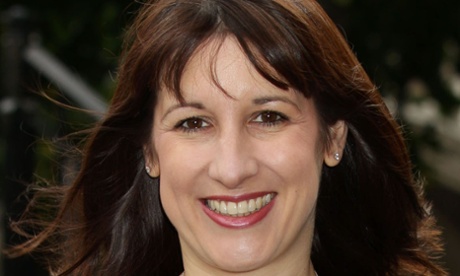
Church of England calls for 'fresh moral vision' in British politics
Church of England bishops have released a “pastoral letter”, the first of its kind delivered before an election, in which they attack a “growing appetite to exploit grievances” and “find scapegoats” in British political life.
You can read the letter here and the Guardian story is here.
The House of Bishops warned that people feel detached from politics and called for a “fresh moral vision of the kind of country we want to be”.
The letter urged people to visit the polling booths on 7 May, stating it was the duty of every Christian adult to vote.
The Bishop of Norwich, the Rt Rev Graham James, said that the letter was meant to counter arguments from people like the celebrity Russell Brand that people should not vote.
We’re conscious that there are a number of voices around, probably the most famous of which is Russell Brand, telling people that they shouldn’t bother with voting... and while one may think that the bishops of the Church of England don’t quite have the sex appeal of Russell Brand, we think that we should counter it.
He said: “I think we hope that this will animate Christians to engage in politics. What we want them to do is to engage in the political processes.”

Updated
Lunchtime summary
- In a speech in Hove, East Sussex, David Cameron has set out his party’s plans for welfare. He has announced that, under a Tory government, 18- to 21-year-olds who fail to find a job or a place in training after six months would be forced to undertake community work in return for a new type of benefit, called Youth Allowance. Here’s a Guardian poll on the plans.
- Figures from the Office for National Statistics show that inflation dropped to 0.4% in January. This is down from the 0.5% recorded in December and well below the Bank of England’s 2% target. Here’s the Guardian’s report on the figures from our economics correspondent Phillip Inman. The government has, unsurprisingly, welcomed the news, with Cameron tweeting that it meant “security for hardworking taxpayers”.
- The Ed Balls receipts row rumbles on. Today, the Telegraph reports that Balls was one of 11 other members of the shadow cabinet who claimed expenses for cleaning, gardening or odd jobs without submitting receipts. Meanwhile, the Daily Mail has managed to track down Balls’s window cleaner, who says that he hasn’t been asked for a receipt in the 17 years he’s cleaned the MP’s windows.
-
Channel 4’s spoof Ukip documentary – which depicted riots on Britain’s streets in the wake of the party’s general election win – has prompted nearly 1,000 complaints from viewers. The programme, which aired last night, has been criticised as revealing the political bias of the broadcaster. Here is the trailer for Ukip: The First 100 Days.
In some more light-hearted news, today is pancake day and – as tradition dictates – MPs, Lords and journalists gathered outside parliament for the annual parliamentary pancake race. The event raises money for the charity Rehab and the journalists won, obviously.

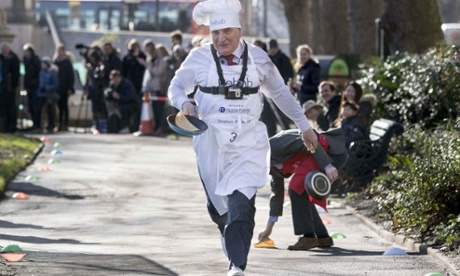
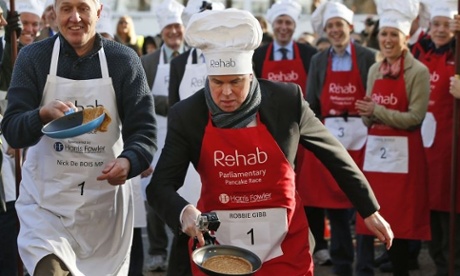

Responses to Cameron’s speech are rolling in.
A spokesperson for the University and Colleges Union has said that the speech exposed “[The Conservative] party’s lack of understanding of the problems too many young people face”.
They added: “Polling shows young people desperately want to work, but many fear they never will. What young people need is politicians who have a plan to help them, not subject them to scapegoating. The individual human tragedy is only part of the story as young people outside education or work cost the country millions of pounds every year. We need to give our young people a commitment of proper guidance and stable, properly rewarded jobs, or educational opportunities.”
Jenny North, director of policy and strategy at youth-focused charity Impetus-PEF, has described the announcement as a short-term solution to a long-term problem.
“Given the structural nature of the youth unemployment problem, with numbers of Neets consistently remaining high through the last 15 years, this seems like another go at cure, rather than prevention.”
She continues: “There isn’t ‘a well-worn path from school to the job centre’, and Neets aren’t the feckless hoodies of media portrayal... The link from school to work has been broken for many years in the UK – and this latest attempt will do little to repair it.”
Media Guardian is reporting that Channel 4’s spoof Ukip documentary – which depicted riots on Britain’s streets in the wake of the party’s general election win – has prompted nearly 1,000 complaints from viewers.
The Guardian’s broadcasting correspondent John Plunkett writes:
Ofcom said it had received 731 complaints following Monday night’s broadcast, which used actors alongside real life documentary footage for its fictional portrayal of Britain under Ukip rule.
Channel 4 said it had received 250 comments about the programme from viewers. It did not specify the nature of the comments but it is likely that the majority were critical.

David Cameron announces Conservative welfare plans – a summary
David Cameron has just finished speaking about his party’s welfare plans in Hove, East Sussex.
He described the system his government had inherited as a national disgrace:
After 13 years of a so-called ‘progressive’ welfare system, we had almost 2 million children living in workless households.
Cameron said that the Conservative party is guided by a few simple principles, one of which is that “work must always be rewarded”.
Yes, we need to reform welfare to save money, but this is also about changing people’s lives and that is why whatever the flack we got – we have got to see this through.
The only new policy announcement from the speech was forcing the young unemployed to do community service for their benefits, which was briefed this morning. The policies Cameron highlighted were as follows –
- Lowering the benefits cap from £26,000 to £23,000.
- Introducing Universal Credit, which, he said, replaces the complexities of the benefits system with a single payment.
- Continuing to increase minimum wage above inflation. He said we are on a trajectory for minimum wage to reach £8 an hour by 2020.
- Raising the tax-free threshold to £12,500 from £10,000.
- Abolishing Jobseeker’s Allowance for 18-21 year olds and replacing it with a Youth Allowance. After six months young people on the Youth Allowance will have to take an apprenticeship or do daily community work for those benefits.
- A Conservative government would use the savings made this and from reducing the benefit cap to fund 3 million new apprenticeships.
Cameron repeated that he’s asked Dame Carol Black to examine whether it is appropriate to withhold benefits from obese people or people suffering addiction who refuse assistance.
We used to have a system where if you had a sick note from the state – it was often a sick note for life... And yes, that means looking at whether people should face the threat of a reduction in benefits if they refuse to engage with a recommended treatment plan.
Cameron has been asked about receipts and he’s said he backs Iain Duncan Smith’s comments. He wants Ed Balls to have more time to clean his own windows and cut his own hair.
That’s it from the questions. Nothing was asked about HSBC or Lord Green.
Asked about today’s letter from the House of Bishops, Cameron says he welcomes debate.
Asked about grammar schools, he says he is in favour of existing grammar schools expanding, but that individual decisions are up to the education secretary. “Good schools should have the freedom to expand”, he says.
Updated
David Cameron has just concluded his speech on welfare:
So we’re rewarding work ending something-for-nothing making sure no-one is left behind and looking after those who genuinely need help.
And these welfare reforms as a whole do something else too:
Restore real fairness to our country.
Our welfare system should be something that unites our country in pride – not that divides it in resentment.
The prime minister is now talking about his proposals to remove sickness benefits from people suffering from addiction or weight problems when they refuse treatment.
We used to have a system where if you had a sick note from the state – it was often a sick note for life. Indeed there are around one and a half million people today who have been on sickness benefits for more than five years. Now of course, if you have a serious disability – physical or mental – and you really cannot work, then the welfare system must be there for you. But the truth is, there are many people receiving welfare who have treatable conditions.
Here is the Guardian article from Saturday – David Cameron calls on obese to accept help or risk losing benefits.
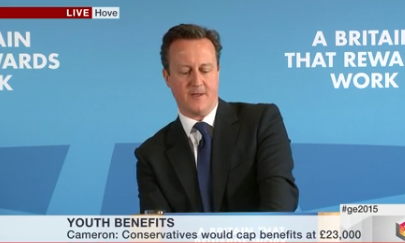
David Cameron says his goal is to abolish long-term youth unemployment by insisting that school-leavers are either “earning or learning”. He is announcing his policy of compulsory community work for young people who have been unemployed for six months.
And then there were the messages we sent young people in this country. You could leave school, sign on, start getting your benefit, start getting housing benefit and the contribution you were asked for was minimal. Turn up every couple of weeks and sign on – tick the boxes, no questions asked.
No CV? No problem.
No real effort put in? No problem.
And all this had a corrosive effect.
For those paying for welfare – it infuriated them. For those dependent on welfare – it infantilised them.
“From day one they must play their part and make an effort”, he says. “It isn’t something for nothing.”
“Whatever the flack we get, we have got to see this through,” says Cameron.
So this is a key, irreducible principle for us: work must always pay. Our vision is a Britain that rewards work. And we are doing some important things to realise that. We have already capped benefits to £26,000 and the next Conservative Government would lower that to £23,000 because no household should receive more in benefits than the average family earns.
We have also announced that we would freeze working-age benefits for two years in the next Parliament, so benefits don’t rise higher than wages, and it pays to be in work. Most important of all, we are introducing Universal Credit. This is sweeping away all the old overlapping benefits that meant you were better off on welfare. It is replacing the complexities with a single payment – ensuring that from the very first hour you work – you will be better off. And already this is getting results.
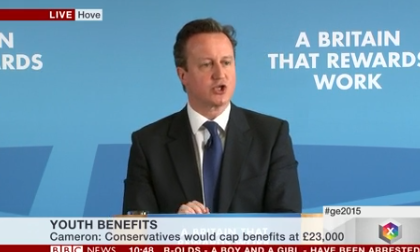
David Cameron has just started speaking about Tory welfare plans in East Sussex.
He says he wants to bust myths, like the idea that you can’t reform welfare without hurting pensions, that you can’t reform welfare because there aren’t enough jobs or that reform hurts the poorest.
He says his government has overseen the largest-scale welfare reform since the Beveridge report.
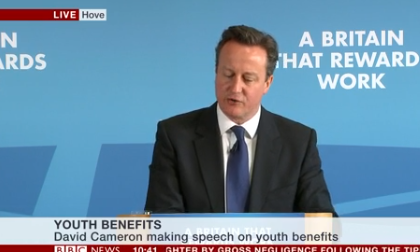
Last night Channel 4 aired a “mockumentary” from film-maker Chris Atkins, which imagines what the first 100 days of a Ukip government would look like.
Ukip MEP Gerard Batten has called for the broadcasting regulator Ofcom to look into the airing of the programme, which depicts riots on the streets in the event of a Ukip election victory.
He told LBC:
I think they certainly should, because as I say, yes, political debate is one thing, and having a debate where people can put another point of view, or even a factual documentary about a political party. But this wasn’t that. I’m not quite sure what you would describe it as apart from a piece of bile and vitriol from our political opponents, who don’t happen to be in a political party, they’re in a TV channel and don’t have to go through the inconvenience of running for office.
The Daily Mail’s James Delingpole also takes issue with the programme, along with last night’s dramatisation of J K Rowling’s novel A Casual Vacancy (which he describes as left-wing propaganda). He asks whether the BBC and Channel 4 will now screen a pre-election drama that mocks the left.
Here’s the Guardian review of Ukip: The First 100 Days. Juia Raeside concludes –
What could have been a nuanced look at a British political phenomenon, ends up not just pat, but feeling like a giant pat on the head. It won’t aid Ukip’s cause in the run up to the election, but it probably won’t make much of a dent in it either.
Look like #100DaysOfUKIP may well have backfired on Channel 4. A biased, partisan depiction of the only party that Believes in Britain.
— Nigel Farage (@Nigel_Farage) February 16, 2015
Updated
UK inflation predicted to fall to lowest level in 25 years
A report just released by the Office for National Statistics shows that inflation dropped to 0.4% in January. This is down from the 0.5% recorded in December and well below the Bank of England’s 2% target.
Here’s the Guardian’s report on the figures from our economics correspondent Phillip Inman.
The government has, unsurprisingly, welcomed the news, with Cameron tweeting that it meant “security for hardworking taxpayers”.
Today's low #inflation means security for hardworking taxpayers & their families. Let's stick to the plan that's raising living standards.
— David Cameron (@David_Cameron) February 17, 2015
Chancellor George Osborne has responded to the figures:
Today we see the lowest CPI inflation ever - a milestone for the British economy. It’s great news for families, whose budgets will stretch even further. It shows that those who went around predicting a cost of living crisis were plain wrong.
Although the low inflation is, as the Bank of England confirmed last week, driven by lower food and energy prices rather than damaging deflation, we will remain vigilant to all risks, particularly when the global economic situation is so uncertain.
Cathy Jamieson, Labour’s shadow treasury minister, has attributed the figures to the fall in global oil prices:
Inflation is falling around the world because global oil prices have plummeted. But in Britain wages continue to be sluggish and working people are £1,600 a year worse off under this government.
A few months of falling world oil prices won’t solve the deep-seated problems in our economy. That’s why we need Labour’s better plan to build a more productive economy that will earn our way to higher living standards for all and so get the deficit down too.
Updated
The Liberal Democrats have responded to the Conservative party’s ‘neet’ plan. For those who don’t know, “neet” means “not in employment, education or training”.
A spokesperson for the party said:
These placements are not designed to help someone into work, more to punish. Just like the Tory plans to axe housing benefit for young people, it’s all stick and no carrot.
Young people should be given help and support into the work place, help at job centres, and the opportunity to get on in life, not just written off as feckless and lazy.
We must make sure young people leave school with the skills they need to succeed, which is why Liberal Democrats will protect education spending. Conservatives plans to take an axe to the education budget will reduce the prospects of thousands of young people.
The Ed Balls receipts row rumbles on. (See this from yesterday’s live blog.)
Today, the Telegraph reports that Balls was one of 11 other members of the shadow cabinet who claimed expenses for cleaning, gardening or odd jobs without submitting receipts.
The shadow chancellor claimed £1,610 for cleaners and his wife and shadow home secretary Yvette Cooper claimed £2,640 for cleaning and gardening, out of a total of £37,881 claimed by the 12 Labour MPs.
Meanwhile, the Daily Mail has managed to track down Balls’s window cleaner, who says that he hasn’t been asked for a receipt in the 17 years he’s cleaned the MP’s windows.
John Durning, who cleans the windows of Balls’s and Cooper’s family home in Castleford, West Yorkshire, told the Mail: “Having lectured the nation on the need to demand receipts, it turns out he doesn’t even do it himself. It is total hypocrisy from a man who wants to be considered as a potential chancellor.”
He said: “This idea from Ed Balls was ludicrous from the start – you can’t expect people to demand a receipt for every minor job they have done. It is basically suggesting that every small trader is dodging tax, which is a slur.”
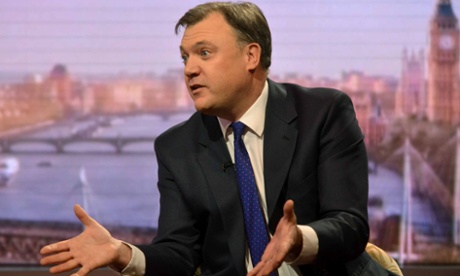
In other tax-dodging news, a video of chancellor George Osborne from 2003, which re-surfaced yesterday, is still doing the rounds online. In in he gives viewers advice on avoiding tax, saying there are “some pretty clever financial products that enable you in effect to pass on your home, or the value of your home, to your son or daughter and then get personal care paid for by the state”.
A Labour source told my colleague Rowena Mason: “We know Cameron and Osborne are turning a blind eye to tax avoidance. But we didn’t know that Osborne was also advising people how to do it in the first place.”
Prime minister David Cameron will be giving a speech in East Sussex around 11am to lay out the Conservative party’s welfare plans. He is expected to announce proposals to force 18- to 21-year-olds who have been unemployed for more than six months to do community work in return for benefit payments.
Young claimants will be expected to undertake at least 30 hours of community work a week and 10 hours’ looking for jobs. They will be paid a youth allowance of £57.35 a week, the same as job seeker’s allowance for 18- to 24-year-olds (compared to an allowance of £72.40 for those over 24).
Cameron is expected to say that he wants to “get rid of that well-worn path from the school gate, down to the Job Centre, and on to a life on benefits”.
Rachel Reeves, Labour’s shadow work and pensions secretary, has been quick to comment on the plans:
With youth unemployment rising, not falling, the government should introduce Labour’s compulsory jobs guarantee to get young people off benefits and into paid work.
Under David Cameron young people can spend years claiming benefit without being offered and required to take up paid work. Labour’s compulsory jobs guarantee would ensure young people are given the chance to learn, earn and contribute.
The choice we face in May is clear. A Tory failing plan which has abandoned thousands of young people or Labour’s plan to get young jobseekers back to work.
I’ll be filling in for Andrew this week, covering all the breaking political news from Westminster, as well as bringing you the most interesting political comment and analysis from the web. I will post a summary at lunchtime and another in the afternoon.
If you want to follow me on Twitter, I’m on @fperraudin.







